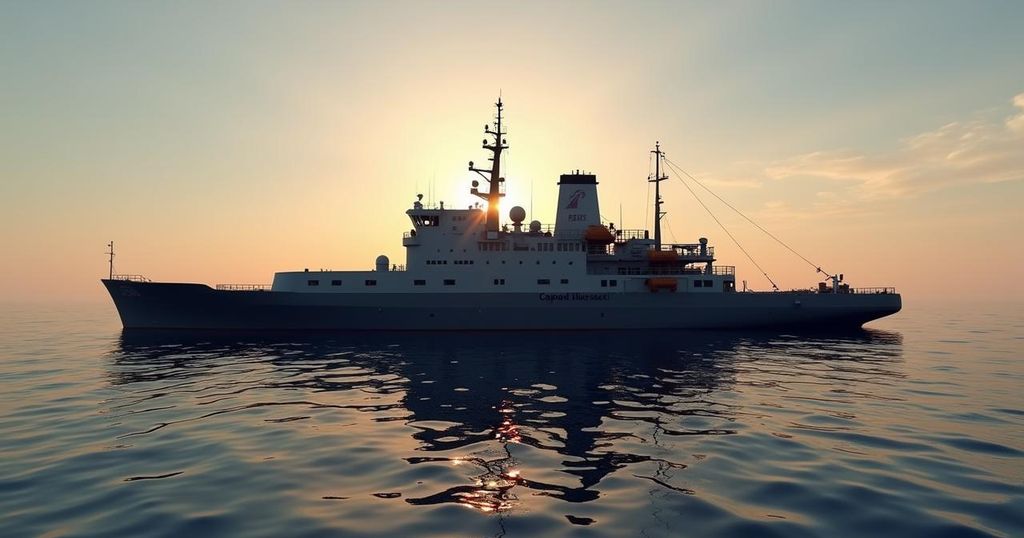Turkey Launches Oruç Reis for Seismic Surveys in Somalia

Turkish President Recep Tayyip Erdoğan oversees the launch of the Oruç Reis seismic research vessel to Somalia for a seven-month mission following a bilateral agreement on exploration rights. The mission is supported by two G-class frigates for naval protection, emphasizing Turkey’s strategic energy interests in the Horn of Africa while reaffirming its influence amid ongoing regional tensions.
On October 5, 2024, Turkish President Recep Tayyip Erdoğan officiated the departure of the Oruç Reis, Turkey’s domestically developed seismic research vessel, as it commenced an expedition to Somalia. This pivotal mission follows a notable agreement established in March between Turkey’s Ministry of Energy and Natural Resources and Somalia’s Ministry of Petroleum and Mineral Resources, which encompasses both onshore and offshore exploration initiatives in Somalia. The Oruç Reis is supported by two G-class frigates, TCG Gediz and TCG Gökova, which are tasked with providing essential naval protection during the mission. These frigates, modern iterations of the Oliver Hazard Perry-class, have been significantly enhanced with advanced military systems, including the GENESIS combat management system, thereby augmenting their operational effectiveness in complex maritime environments. This deployment signals Turkey’s strategic interests in the Horn of Africa, where the nation has secured exploration rights spanning a 15,000-square-kilometer maritime area off Somalia. The mission, anticipated to last around seven months, intends to conduct 3D seismic surveys across multiple licensed zones, with the data collected being crucial for identifying potential drilling locations for future extraction efforts. The escort by Turkish naval forces underscores Ankara’s resolve to protect its energy interests, particularly in regions characterized by heightened security threats, such as piracy or ongoing regional conflicts. This operation not only reinforces Turkey’s expanding influence in the African continent but also aligns with the nation’s broader strategic aspirations to secure energy resources beyond the Mediterranean Sea, where the Oruç Reis previously engaged in contentious explorations.
The Oruç Reis seismic research vessel has played a significant role in several contentious exploration missions, particularly in the Eastern Mediterranean, as Turkey’s energy ambitions have led to conflicts with neighboring states such as Greece and Cyprus. These disputes primarily arise from overlapping claims regarding Exclusive Economic Zones (EEZs) within the resource-abundant waters of the Eastern Mediterranean. Turkey’s controversial exploration initiatives began in 2020, when the Oruç Reis was deployed near the Greek island of Kastellorizo, an area claimed by both Greece and Turkey based on divergent interpretations of maritime boundaries. Turkey maintains that islands should not be granted full EEZ rights, a position that differs from Greece and Cyprus’s reliance on the United Nations Convention on the Law of the Sea (UNCLOS). Notably, Turkey is not a party to UNCLOS and advocates for a more flexible interpretation of oceanic boundaries to advance its regional interests. These operations notably heightened tensions between Turkey and Greece, leading to a series of naval deployments, diplomatic protests, and calls within the European Union for sanctions against Turkey. Incidents of near-miss military confrontations also occurred between Turkish and Greek naval forces during this contentious period, prompting NATO to intervene and establish a mechanism to reduce the risk of accidental clashes between the two Allied nations.
The departure of the Oruç Reis research vessel signifies a pivotal moment for Turkey’s strategic operations in the Horn of Africa, reinforcing its energy interests while concurrently highlighting ongoing tensions in the Eastern Mediterranean. Through this mission, Turkey aims to bolster its influence and secure vital energy resources amidst a backdrop of complex regional dynamics and security challenges. The international community will be closely observing the ramifications of this deployment, particularly in light of Turkey’s prior controversial explorations and the geopolitical implications therein.
Original Source: www.armyrecognition.com








